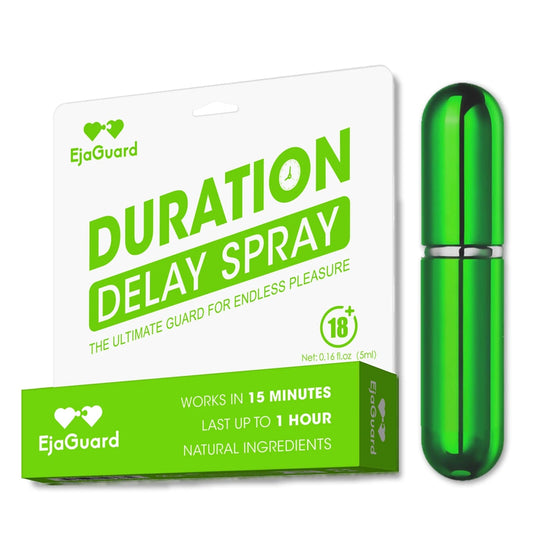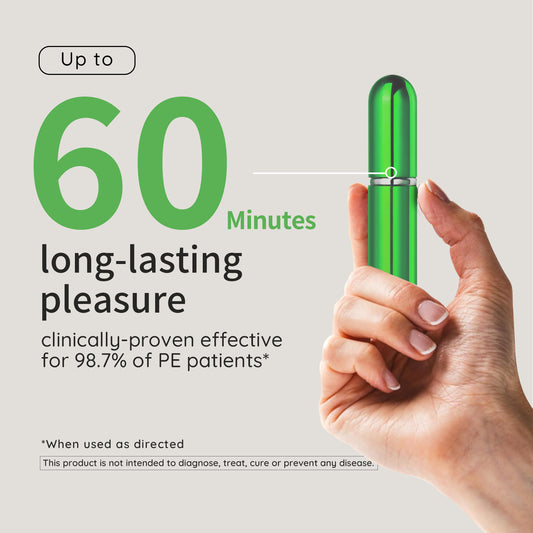Before delving into why male ejaculation time decreases, it's crucial to recognize that this issue is exceedingly common and widespread. Many men have experienced or are currently experiencing this condition, which can lead to feelings of frustration and self-doubt. However, it's important to understand that decreased ejaculation time doesn't necessarily indicate serious health issues. Instead, it's a common phenomenon with various potential causes, each worthy of exploration and understanding.

Let's embark on a comprehensive exploration together to uncover the multifaceted factors contributing to decreased male ejaculation time.
Physiological Dynamics: As men age, their bodies undergo a series of physiological changes, including fluctuations in hormone levels and alterations in neural responses. These changes can affect arousal patterns, thereby influencing ejaculation time. Additionally, age-related changes in vascular health and penile tissue sensitivity may also impact ejaculation speed.
Psychosocial Influences: Beyond the physiological realm, psychological and social factors play a significant role in sexual function. Stress, anxiety, depression, and relationship dynamics can all influence male sexual experiences, thereby affecting ejaculation time. Pressures from work, family responsibilities, and societal expectations may exacerbate these psychosocial influences, leading to shortened duration of sexual activity.
Lifestyle Choices: Our lifestyle habits can have profound effects on sexual health. Poor dietary choices, sedentary lifestyles, excessive alcohol consumption, and smoking can all contribute to diminished sexual function, including decreased ejaculation time. Conversely, adopting healthy lifestyle practices such as a balanced diet, regular exercise, and adequate sleep can positively impact sexual performance.
Sexual Behavior Patterns: Our sexual habits and behaviors can also shape ejaculation time. Frequent masturbation or sexual intercourse without sufficient variation in stimulation can desensitize the penis, leading to quicker ejaculation. Additionally, societal norms regarding sexual performance may inadvertently prioritize speed over intimacy, further exacerbating the issue.
Health Conditions and Medications: Certain health conditions such as diabetes, hypertension, and prostate issues may impact sexual function and ejaculation time. Similarly, certain medications including antidepressants and antihypertensives may affect the duration of ejaculation. Addressing underlying health issues and consulting healthcare professionals for medication alternatives are crucial for managing ejaculation time.
Now that we've elucidated the myriad factors contributing to decreased male ejaculation time, let's explore comprehensive strategies to address this issue:
Comprehensive Health Promotion: Adopting a holistic approach to health encompassing physical, mental, and emotional well-being is paramount. Prioritize activities that promote relaxation such as mindfulness practices, exercise, and hobbies to alleviate stress and anxiety.
Pelvic Floor Muscle Exercise: Strengthening pelvic floor muscles can enhance control over sexual activity, prolonging ejaculation time. Engaging in pelvic floor muscle exercises such as Kegels can boost ejaculation control.
Prolonged Foreplay: Increasing the duration of foreplay can heighten sexual stimulation, aiding men in better relaxation and prolonging ejaculation time. Experimenting with different kissing, embracing, and caressing techniques can enhance emotional connection and increase sexual pleasure.
Communication and Connection: Establishing open and honest communication with partners about sexual desires, issues, and preferences is crucial. Building intimacy can enhance satisfaction and extend ejaculation time.
Diversity and Trying New Things: Exploring various sexual activities and techniques prioritizing pleasure and intimacy over performance can prolong ejaculation time. Trying different positions, rhythms, and forms of stimulation can add novelty and excitement to sexual experiences while prolonging ejaculation time.
Professional Guidance: If efforts to address ejaculation time issues become challenging or underlying health issues are suspected, seeking guidance from healthcare professionals such as sex therapists, urologists, or mental health professionals is essential. These experts can provide personalized strategies and interventions tailored to individual needs.
In conclusion, decreased male ejaculation time is a multifaceted issue influenced by physiological, psychological, social, and lifestyle factors. By adopting a comprehensive approach to address these different dimensions, men can reclaim control over their sexual experiences and enhance overall health.
Wishing all gentlemen satisfaction and vitality in sexual health!
FAQS
Q: What causes decreased male ejaculation time?
A: Decreased ejaculation time can result from various factors including age-related changes, stress, unhealthy lifestyle habits, certain health conditions, and medications.
Q: Is decreased ejaculation time a sign of a serious health problem?
A: While it can sometimes indicate underlying health issues, decreased ejaculation time is often a natural occurrence, especially with aging. However, it's essential to consult a healthcare professional if concerned.
Q: Can stress and anxiety affect male ejaculation time?
A: Yes, psychological factors like stress and anxiety can interfere with sexual performance, including ejaculation time, by impacting arousal and overall sexual function.
Q: Are there lifestyle changes that can help improve ejaculation time?
A: Yes, adopting a healthy lifestyle such as maintaining a balanced diet, regular exercise, stress management, avoiding excessive alcohol and smoking, can positively influence ejaculation time.
Q: Are there specific exercises to improve ejaculation control?
A: Pelvic floor muscle exercises, commonly known as Kegel exercises, can help strengthen muscles involved in ejaculation control, potentially improving overall sexual function.
Q: Can medications affect ejaculation time?
A: Yes, certain medications, particularly antidepressants and antihypertensives, may have side effects that affect ejaculation time. Consulting a healthcare provider for possible alternatives is advisable.
Q: How important is communication with a partner regarding decreased ejaculation time?
A: Communication with a partner is crucial. Open discussions about sexual desires, concerns, and preferences can alleviate stress and improve intimacy, contributing to better sexual experiences.
Q: Is professional help available for men experiencing decreased ejaculation time?
A: Yes, healthcare professionals such as sex therapists, urologists, and mental health professionals specialize in sexual health and can provide guidance and tailored treatment options.
Q: Can certain sexual techniques or positions help prolong ejaculation time?
A: Experimenting with different sexual techniques, positions, and rhythms may delay ejaculation and enhance sexual satisfaction for both partners. Finding what works best through exploration and communication is key.
Q: Is decreased ejaculation time reversible?
A: In many cases, yes. Addressing underlying factors such as stress, unhealthy habits, or health conditions, and implementing appropriate strategies and treatments can often improve ejaculation time and overall sexual function.
KEY TAKEAWAYS
• Male ejaculation time decreases due to various factors.
• Healthy lifestyle and open communication are crucial.
• Professional guidance offers effective solutions.
• Understanding factors improves sexual health.
• Addressing stress and health issues is key.
 Buy Now
Buy Now



